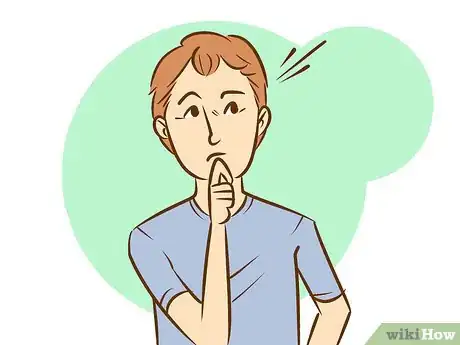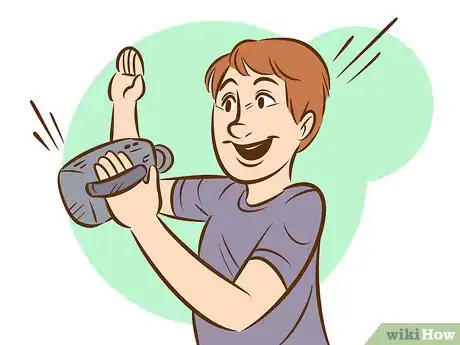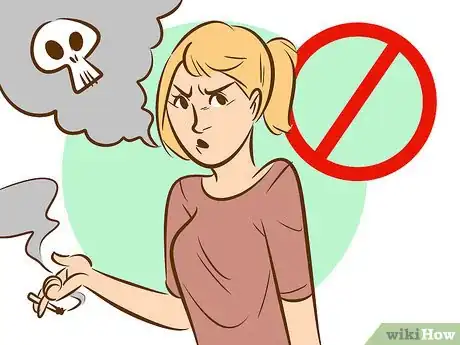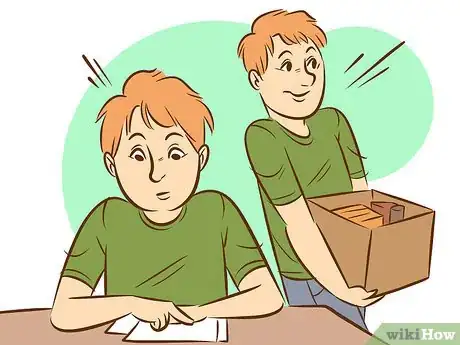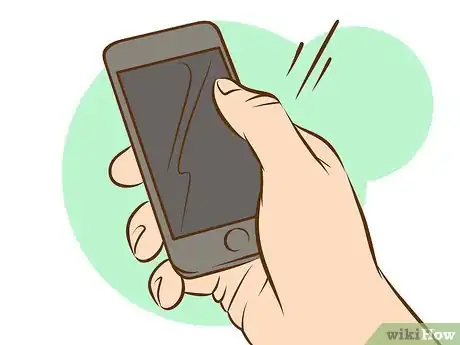This article was co-authored by Trudi Griffin, LPC, MS. Trudi Griffin is a Licensed Professional Counselor in Wisconsin specializing in Addictions and Mental Health. She provides therapy to people who struggle with addictions, mental health, and trauma in community health settings and private practice. She received her MS in Clinical Mental Health Counseling from Marquette University in 2011.
There are 14 references cited in this article, which can be found at the bottom of the page.
This article has been viewed 131,308 times.
Are you in a slump? Do you feel like your life is full of chaos? Trying to get control of your life can be very difficult. Improving your quality of life, making positive changes, and looking inward can help you start to improve your circumstances. By making small changes and focusing on yourself, you can work towards get your life together.
Steps
Focusing on Yourself
-
1Remind yourself that you are in control of your choices. Many of the bad or unpleasant things that happen in life are out of your control. Blaming others for your circumstances makes you powerless, however. While you can’t control everything that happens in your life, you can choose how you react to whatever life throws at you, and take responsibility for the things you can control.[1]
- Be honest with yourself. Everyone comes up with excuses and blames others sometimes. Recognizing these behaviors in yourself is the first step to changing them. Be objective and pinpoint places where you can improve.
- Remember that your choices, thoughts, and actions are in your control, not someone else's. Acknowledging this helps you move forward.
- If you do mess up, accept that it happened, but don't dwell on it. Instead, move past it and try to change your behavior so you don't do it again.
-
2Identify the things in your life that you can change. Instead of agonizing over what you can’t change, figure out what is in your control and what you can change. Make a list of problems in your life and pinpoint which things you can control and which ones you can’t.
- For example, if you’re dealing with family drama, you might say, “I can’t control how my sister behaves. I can set healthy boundaries and say ‘no’ when she makes unreasonable demands.”
Advertisement -
3Let go of what you can't change. Sometimes things will happen to you that are out of your control. Since you can't change or fix these things, let them go.[2] It’s okay to acknowledge these things and feel frustrated by them. Remind yourself that it’s not helpful to dwell on things you can’t fix, however, and then go do something productive to take your mind off of it.[3]
- Things in our past are beyond our control. Learn from past mistakes, but try not to fixate on them. You can't successfully move forward if you keep looking backward.
- You can't change other people, only yourself. Don't obsess over what other people do. Talk to people if they hurt you, but if you have done everything you can, let it go. You can only control yourself.
-
4Figure out what makes you happy. Understanding what makes you happy and content can be the hardest question to answer. If you are unhappy and feel your life is out of control, start by asking yourself, "What will make me happy?" Answer truthfully. Figuring this out can help you focus on the positive aspects of life and start to get your life together.
- Answer realistically. Travelling around Europe for 6 months or becoming a millionaire may be out of your reach. However, saving up for a vacation or getting a job promotion are things that you can work on achieving.
-
5Assess your core values. Are they honesty, compassion, love, acceptance, dedication, or hard work? Whatever they are, figure them out and write them down. Then look at your life. Are you living up to your core values? Are the people in your life living up to them? Knowing what you value can help you be a better person and help you surround yourself with better people.[4]
-
6Identify stressors in your life and work on minimizing them. It’s impossible to avoid all forms of stress—you probably have a variety of responsibilities in your life, like paying your bills, caring for family, working, or going to school. You can, however, change certain aspects of your responsibilities so they don't always feel like such a burden.
- Are there better days for you to perform certain responsibilities? Can you buy groceries on a Thursday night instead of spending your Saturday in the grocery store? Find ways to adjust your life so you get everything done but still have time for yourself.
- Does your job make you happy? If not, decide how you feel about that. Do you want a different career or a promotion? Or are you happy with your job despite not being passionate for your work because it has flexible hours or great pay?
- You don't have to be passionate about everything in life. Instead, decide if you are okay with the aspects of your life and accept what role they play.[5]
-
7Acknowledge that you can't do it all. There is so much pressure on us to juggle everything, and to do it perfectly. You are only 1 human being, and there are only 24 hours in a day. You can't possibly do everything, so don’t feel like a failure if you have to let things slide sometimes. Do what you can, and let the rest go.
- Prioritize your time and commitments. This is especially important if you are busy and pressed for time. Decide what has to be done, what things can slide, and what needs your attention.
- Make a to-do list. This can help you not forget anything. It will also give you a sense of accomplishment once you finally cross things off the list. Just remember, don't be discouraged if you don't finish everything. Instead, focus on what you have finished.[6]
-
8Accept that your abilities and values may change. Setbacks, tragedies, and stressful periods are bound to happen in your life from time to time. Once you start moving forward again, you may expect to be the exact same person you were before. This isn't always the case. Every experience you have changes you in some way. Don't get upset because you are different than you were 1, 5, or 10 years ago. Instead, embrace the new you as you move forward and put your life back on track.
- Not all changes are permanent. For example, if you are going through a depressive period, this doesn’t mean you’ll never feel happy again. You may just need to look for new ways to find meaning and fulfillment in your life.[7]
-
9Change "I'm not" to "I am”. Think about how many times you say "I'm not" in a day. What have you convinced yourself that you can't do? Societal pressures may shape your thinking, so that you start to believe you’re not young enough, wealthy enough, or smart enough to do the things you want to do. Stop thinking like that. Instead of thinking "I can't do that" or "I'm not that kind of person," look at the things you want to do realistically and objectively, and think about ways you could work towards achieving them.
- For example, if you've ever thought "I'm not a runner," ask yourself why. Is it because you physically can't run due to an injury, because you're not a marathon runner with an 8 minute mile stride, or because you've never tried? Instead of just accepting that thought, think about realistic goals you can set to get you on the path to running. If you have an injury, consider signing up for physical therapy. If you’re out of shape, you might start with a couch-to-5k program. Even if your best pace is a 13-minute mile, you're still running![8]
- Try new things. Do something that scares you and that you think you can't do. Sometimes you will fail or feel like an idiot. But sometimes you will succeed, improve your life, and even make friends.
-
10Put yourself first. Sometimes, the best way to get your life together is to put yourself first. That may mean cutting off contact with people who have a negative influence on your life instead of keeping them around out of obligation. It may mean making a decision people don't agree with, because it's best for you. Most of all, it means staying true to what is best for you.
- Of course you don't want to hurt the people you love, but if you are doing what's right for you, they should understand and support you. The people you love shouldn't bring you down. If they do, talk to them.
- Learn to say no. You don't always have to do everything for everyone else. Sometimes, you don't have time to commit to something or don't have the energy to do something. That's okay. Saying no doesn't make you a bad person.[9]
-
11Put yourself out there. One way to get your life together is to move forward and move on. Getting your life together includes making a life for yourself. This may include joining new organizations, finding new friends, or trying a new hobby. It might mean just getting out of your house on a weekend. Whatever it is, go ahead and get out of the house.
- Join a community organization to meet people and get involved. Put a profile on an online dating site. Join a meetup group and go to an event.[10]
-
12Give yourself time to heal if you’ve suffered a setback. Don't move on or put yourself out there before you are ready. There is no timeline for when you should be healed. Some people heal faster than others. There's nothing wrong with that. However, you may need to push yourself out of your rut. Start small. Call up a friend. Go to a community event. Go somewhere you've never been. See how you feel when you do it. If it's too much, take some more time. If you feel okay, then maybe you're ready to get out there more.
-
13Stop basing your worth on external factors. One reason people are unhappy is that they put their entire worth on the outside. They think money will make them happy, or a prestigious job, or looking their best. There is nothing wrong with wanting a good job, to have enough money, or to look your best, but making your entire existence about this is unhealthy and damaging.
- Focus instead on internal factors. Don't compare yourself others. Be the best you that you can be. Enjoy what your financial circumstances allow you, even if that is just going on day trips instead of month-long voyages to the Caribbean.
- Live your life according to your core values. Be a good, honest, loyal, hardworking person. Value your individual work and what you offer the world above being the best at everything.[11]
- Instead of focusing on your image, choose to do things that build on your individual strengths. For example, if you’re trying to decide on a career path, choose something that you find interesting instead of whatever seems most prestigious.
Making Positive Health Changes
-
1Get moving. Exercise is a great way to make a positive change for yourself. Not only does exercise make you look and feel good, but it also increases your overall health. Exercise reduces stress and anxiety and helps you relax. Plus, exercise releases endorphins, which boost your mood.[12]
- Start by getting out of the house and walking for 30 minutes 3 times a week.
- Go for a hike in a park you've never been to.
- Join a gym and go to a spin, weightlifting, zumba, or crossfit class.
- Sign up for that 5k you've always wanted to do and start training to run it.
-
2Eat healthy. Another way to take control of your life is to change your eating habits. By adopting a healthy lifestyle, you will lose weight, feel better, and improve your health. Start small and add new things every week or 2. Even making small changes can yield huge benefits on your body and mind.
- Cut out processed food. That includes boxed meals, take out, and prepackaged snacks. These things are not good for your body.
- Replace processed, artificial foods with natural foods. Eat fruits and vegetables. Eat usable carbs, like quinoa and oatmeal. Eat lean meats, such as fish and chicken. Eating healthy doesn't mean starving yourself. Simply make better choices for meals and snacks.[13]
- For breakfast, try an omelet with tomato, spinach, ham, and avocado. Or try oatmeal with fruit, like strawberries, pineapple, or banana, nuts, and dark chocolate chips.
- For lunch, eat a kale bowl with sautéed vegetables such as kale, asparagus, carrots, or broccoli, avocado, tomato, chickpeas, beans such as cannellini or black beans, protein such as chicken, tilapia, or salmon, and feta cheese.
- For dinner, cook a lean protein and an array of vegetables.
-
3Plan to take a “mental health day” on occasion. If you’re overworked and exhausted all the time, you’ll eventually start to burn out and become less productive. If you can, take a day off from your job once in a while, or set aside a day when you don’t do any school work. Use your free time for self-care and relaxation.
-
4Give up unhealthy vices. Another way to get your life together is to try to get rid of unhealthy and harmful vices. Try to cut back on alcohol if you drink too much. Quit smoking. Look at your unhealthy, damaging habits and start trying to change them.[14]
- Remember to start slow, and don't try to do everything at once. Some unhealthy habits, like smoking, can be extremely hard to break.
- If you want to quit drinking or smoking, but aren’t sure how to do it, talk to your doctor. They may be able to offer practical advice or prescribe medications to help you quit, if necessary.
-
5Make small changes. When making positive changes in the way you eat and exercise, start slowly. Don't try to do everything at once – that is a recipe for failure. Think about it as a layered process. Each time you adopt one new habit, you build on that to change another habit. Each small success is one step towards a better you, and eventually, these small changes will add up to a big change.
- Start by writing down what you want to change. Then, think about how you can change it. Look at the list. What is something you feel you can accomplish this week? Maybe you're not ready to give up sugar completely, but you can start by eating a healthier breakfast every day this week.
- Once you gain some momentum and feel successful in what you've accomplished so far, your bigger goals will not seem so impossible to tackle.
Getting Organized
-
1Set aside 10 minutes a day to clean. This doesn't sound like a lot of time, but when you're busy and feel your life is out of control, you may feel like you don’t have 10 minutes to spare. Plan to take 10 minutes every day to clean something in your home. You can't clean everything in 10 minutes, but that's okay. You are taking small steps at improving your living space, which in turn will make you feel better.
- Set an alarm for 10 minutes and turn on some music. Spend that time making your bed, putting away laundry, loading the dishwasher, vacuuming – whatever chore needs to be done.[15]
- Assign a room for each day of the week. Mondays you clean your bedroom, while Tuesdays are for your bathroom, and Wednesdays you work on your kitchen. This way you tidy up your entire home throughout the week.
-
2Focus on one thing at a time. Our lives are chaotic. We have multiple commitments and only 24 hours in a day. With technology at our fingertips, we spend a lot of the day multitasking. While this can be effective, it also can be counterproductive and make us feel even more disorganized and spread thin. Try taking your tasks and focusing on them one at a time.[16]
- Instead of working on 5 different incomplete projects and making a small amount of progress in each one, choose 1 project to devote your time to until you have finished it. That's 1 less thing on your to do list.
- Don't try to clean your entire house at the same time. Focus on 1 room and refrain from moving to another room until that room is clean.
-
3Have "Get Things Done" days. Because things pile up and make us feel like failures, schedule "Get Things Done" days. During these days, focus on getting caught up on tasks that get pushed to the side during your normally hectic schedule.
- Sort through your mail, do your laundry, or take the recycling to the nearest center.
- These days can be used for things that aren't chores. Respond to e-mails, call your parents, or have lunch with a friend.[17]
-
4Use technology to your advantage. Smartphones are convenient devices, and they can help you get your life together. There are apps for just about everything. This means you can set up reminders for yourself, plug everything into a calendar, and have everything in one place so it's convenient for you.
- Try a list app. Use this to make to do lists of what you need to do every day, for that week, or just in general. Use the app to make a list of things you want to do, like what movies you want to see and activities you want to complete.
- Use fitness apps. There are apps that will lead you through workouts and race training programs. Other apps will count your calories and give you recipe suggestions for weight loss. There are even apps that will remind you to drink water. These apps can help you stay on track, keep you motivated, and remind you to stay healthy.[18]
References
- ↑ http://tinybuddha.com/blog/take-back-your-power-and-start-loving-your-life/
- ↑ http://tinybuddha.com/blog/take-back-your-power-and-start-loving-your-life/
- ↑ https://www.psychologytoday.com/us/blog/what-mentally-strong-people-dont-do/201705/how-stop-worrying-about-things-you-cant-change
- ↑ http://www.elephantjournal.com/2014/09/the-art-of-putting-yourself-back-together-moving-through-difficult-times-leah-neas/
- ↑ http://hellobeautiful.com/2014/04/15/how-to-create-a-life-plan/
- ↑ https://litemind.com/life-in-order/
- ↑ http://thebounceblog.com/2012/08/15/some-disassembly-required-5-lessons-to-put-yourself-back-together-after-falling-apart/
- ↑ http://www.huffingtonpost.com/rachel-chang/after-the-fall_1_b_4976784.html
- ↑ http://tinybuddha.com/blog/take-back-your-power-and-start-loving-your-life/
- ↑ http://www.elephantjournal.com/2014/09/the-art-of-putting-yourself-back-together-moving-through-difficult-times-leah-neas/
- ↑ https://www.psychologytoday.com/us/blog/click-here-happiness/201807/39-core-values-and-how-live-them
- ↑ http://greatist.com/fitness/13-awesome-mental-health-benefits-exercise
- ↑ http://www.nerdfitness.com/blog/2011/11/10/healthy-eating/
- ↑ https://litemind.com/life-in-order/
- ↑ http://www.teenvogue.com/advice/2014-04/type-a
- ↑ http://www.oprah.com/home/12-Ways-to-Unclutter-Your-Life
- ↑ http://hellogiggles.com/intro-gylt-get-life-together-days/
- ↑ http://www.washingtonian.com/blogs/wellbeing/guides/5-free-apps-that-will-help-you-get-your-life-together.php
About This Article
If you want to get your life together, put yourself first and cut off contact with people who have a negative influence on your life. Putting yourself first could mean making decisions people in your life don’t agree. However, if you’re truly doing what’s right for you, your friends and family should understand and support you. One way you can work on yourself is by exercising regularly to reduce stress and increase your overall health. In addition to being active, take control of your life by cutting out processed foods like boxed meals, and eat fresh fruits and vegetables instead. Another way to gain control over life is to spend 10 minutes a day cleaning and organizing an area of your home, which will help you feel like you’re making tangible improvements. For more tips from our Mental Health co-author, like how to figure out what makes you happy, read on.



